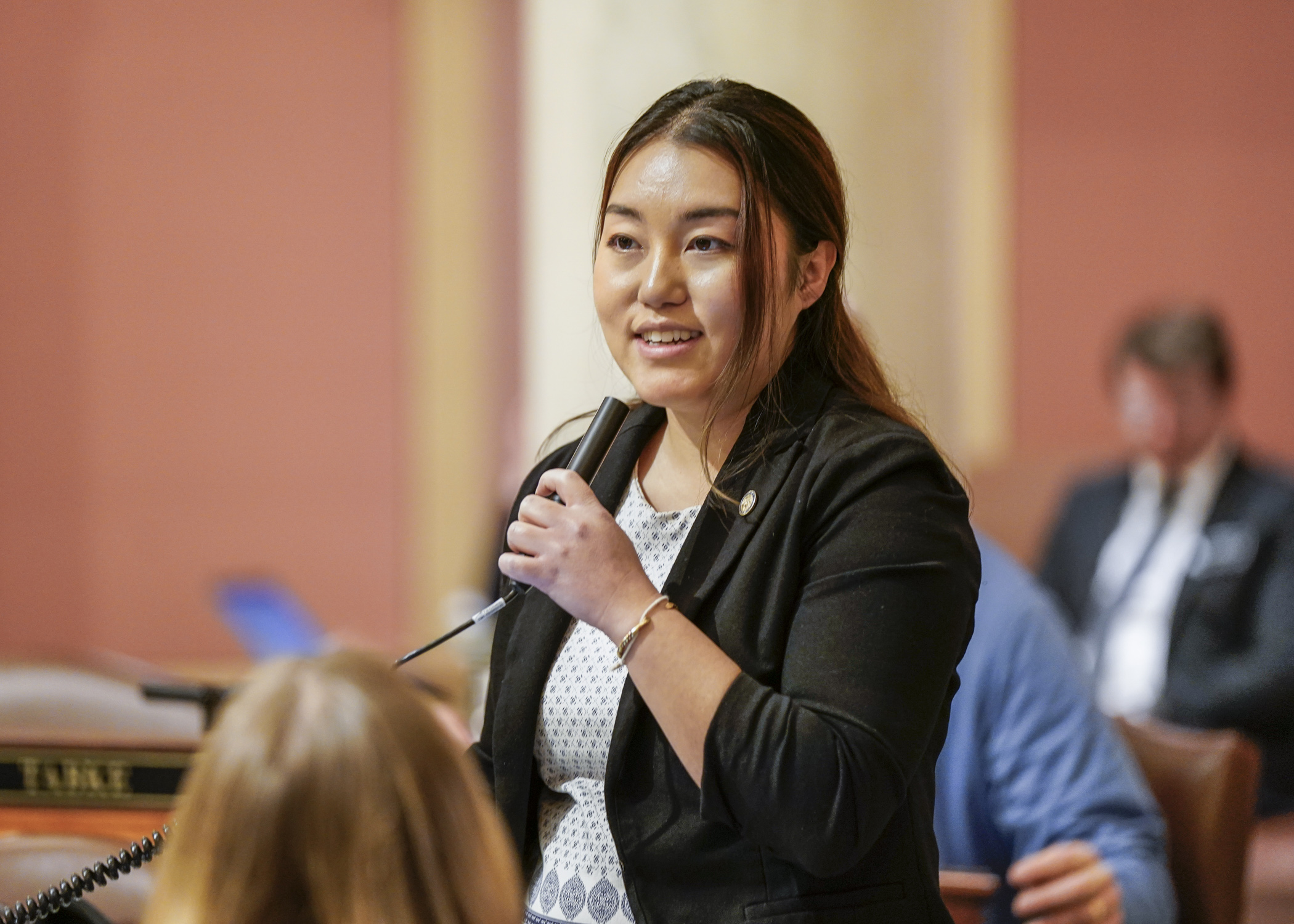Seed money for grain indemnity fund included in House, Senate bills as omnibus conference meets

A new grain indemnity fund seems assured in the next few years as the program to compensate grain farmers when an elevator fails has support from both chambers of the Legislature.
Start-up money for the fund is provided in HF2278/SF1955*, though at different levels. The Senate has budgeted $14 million during the upcoming biennium while the House proposes a $5 million appropriation.
That provision is one of many areas of agreement in the omnibus agriculture, broadband and rural development finance bills a conference committee began to review Monday.
Conferees may be back together under the gavel of Sen. Aric Putnam (DFL-St. Cloud) Wednesday. A Thursday meeting led by Rep. Samantha Vang (DFL-Brooklyn Center) is planned.
More controversial are provisions in the House bill that would prohibit registration of pesticides containing perfluoroalkyl or polyfluoroalkyl substances, regulate pesticide treated seeds and alter the make-up of the Board of Animal Health.
The omnibus bills would increase General Fund spending for agriculture programs and personnel by $148 million in the next biennium. This includes $100 million more to the Office of Broadband Development.
[MORE: See omnibus side-by-side comparison, detailed spreadsheet, change items only]
What’s the difference?
Senate General Fund appropriations for the next biennium include:
- $3 million more than the House for biofuels infrastructure;
- $2 million for soil health grants compared to $500,000 in the House;
- $1.5 million for living cover crop grants compared to $1 million in House;
- $1 million for the Minnesota Agricultural Education Leadership Council compared to $500,000 for House; and
- $650,000 for compensation and conflict prevention when elk, deer and wolves interact with farms and livestock.
The Senate would transfer $900,000 from the University of Minnesota’s Agriculture Research Education, Extension and Technology Transfer program’s cultivated wild rice breeding account to Minnesota Tribal Government wild rice research, a provision not in the House bill.
Provisions for additional funding in the House bill, but not in the Senate’s, include:
- a $2.5 million transfer into the Pollinator Research Account;
- $2 million to support urban and youth agriculture;
- $2 million for research into heritage oilseeds;
- $2 million to Farm to School Program that helps education institutions source food locally;
- $1 million for incentives to expand meat processing capacity;
- $1 million to Good Food Access Program; and
- $1 million to expand a deep winter greenhouse program.
Agriculture Commissioner Thom Petersen wrote he appreciates inclusion of a majority of his department’s priorities, including funding the Agricultural Growth, Research, and Innovation program beyond its 2025 sunset, addressing noxious weeds and soil health, offering assistance to emerging and beginning farmers, support of international trade efforts and beefed up animal disease preparedness and response.
He said the department has concerns about some Board of Animal Health provisions in the House bill that would increase the board to 11 members, permit members who are not veterinarians and livestock producers, and allow the governor to appoint the state veterinarian instead of the board.
Other House provisions would authorize a surcharge on technology license and permit fees charged by the Department of Agriculture, increase fertilization inspection fees, and establish hemp fiber processing equipment grants.
Some Senate-only provisions would allow holders of cottage food licenses to deliver food through the post office; extend the AGRI program indefinitely, rather than a 10-year extension in the House bill; and require the Agriculture Department report on alternate ways to pay claims under the state’s bioincentive program.
Border to border broadband
Both versions of the omnibus bill would send an additional $100 million to the Office of Broadband Development and increase the maximum grant allowed from $5 million to $10 million. Both also provide $40 million for lower population density areas, where a 50% match requirement is insufficient to encourage building broadband in unserved or underserved areas.
Grants in the program can be up to 75% of a project’s cost. The program would sunset Dec. 31, 2026, per the House bill.
Related Articles
Search Session Daily
Advanced Search OptionsPriority Dailies
Speaker Emerita Melissa Hortman, husband killed in attack
By HPIS Staff House Speaker Emerita Melissa Hortman (DFL-Brooklyn Park) and her husband, Mark, were fatally shot in their home early Saturday morning.
Gov. Tim Walz announced the news dur...
House Speaker Emerita Melissa Hortman (DFL-Brooklyn Park) and her husband, Mark, were fatally shot in their home early Saturday morning.
Gov. Tim Walz announced the news dur...
Lawmakers deliver budget bills to governor's desk in one-day special session
By Mike Cook About that talk of needing all 21 hours left in a legislative day to complete a special session?
House members were more than up to the challenge Monday. Beginning at 10 a.m...
About that talk of needing all 21 hours left in a legislative day to complete a special session?
House members were more than up to the challenge Monday. Beginning at 10 a.m...